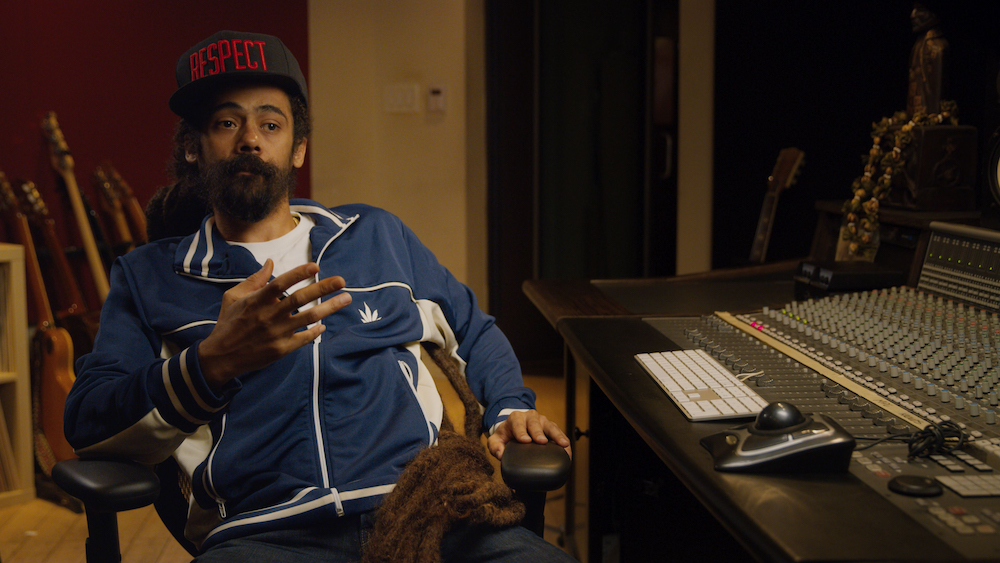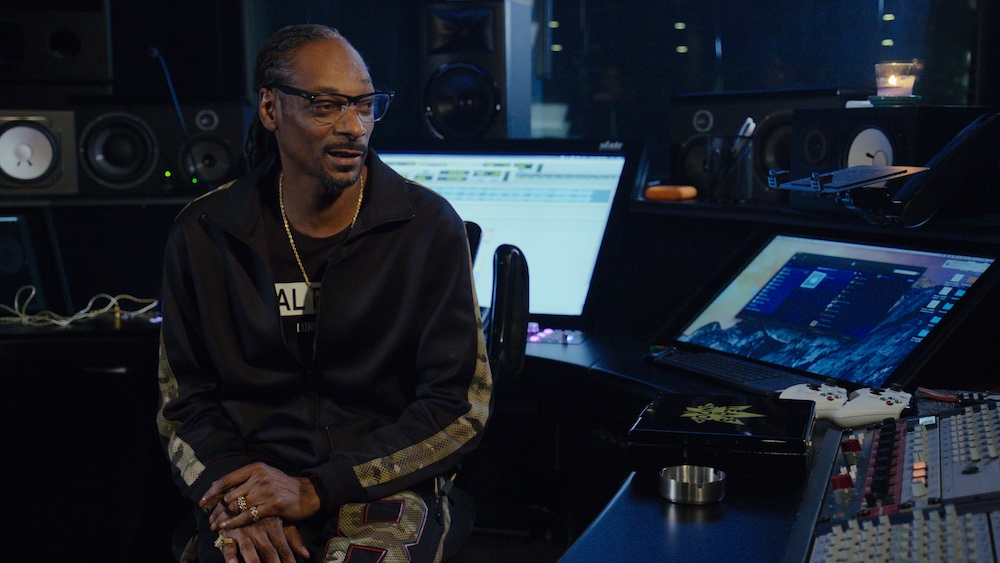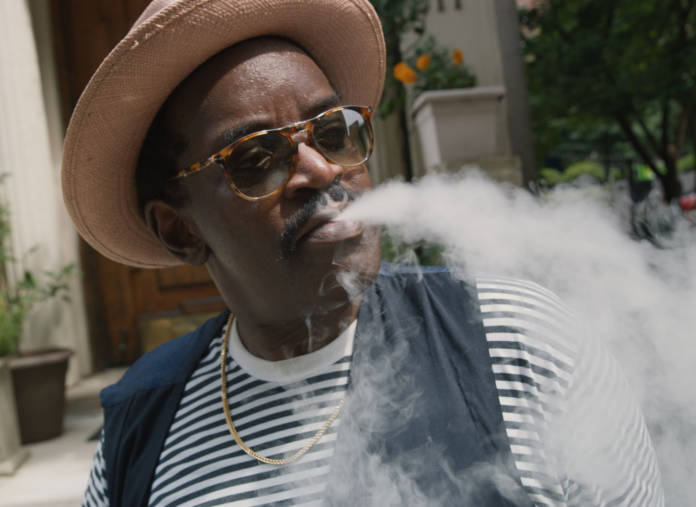In the early ‘80s, Fab 5 Freddy helped popularize graffiti art by taking it from the sides of New York subway cars to the walls of hip international galleries. Later that decade, he introduced a wider demographic to hip hop music as the host of “Yo! MTV Raps.”
Now, with his new Netflix documentary “Grass is Greener,” the director of 70-plus music videos for artists including Nas, Queen Latifah, and KRS One is hoping to win more politicians and their constituents over to the idea of cannabis legalization.
To do this, the hip hop pioneer, visual artist, and pot connoisseur packs his feature-length directorial debut with an easy to ingest history of the racially biased war on marijuana that is still hard to stomach. He views this history through a musical lens, bringing in stories and histories of jazz, hip-hop, reggae, and pop icons to put unique spin on the subject.
Featuring interviews with Snoop Dogg, Cypress Hill, Damian Marley, and a slew of experts, the documentary demonstrates how a “harmless” little flower that has influenced some of the most groundbreaking music and culture of the last century and reportedly brought relief to many suffering from anxiety and physical pain, has at the same time destroyed the lives of many in the black and Latino communities, as a result of the plant’s racially motivated criminalization.
To put it bluntly, not only are people of color more likely to be locked up for possessing or selling marijuana but also they’re more likely to be locked out of the growing and highly lucrative marijuana industry because of their rap sheets.
48 Hills spoke to Fab 5 Freddy (born Fred Brathwaite) about making the definitive potumentary about the intersectionality of race, jazz and rap, and reefer, his personal experience with weed, and what viewers can do to help legalize pot in their state and get nonviolent prisoners with pot convictions released from jail.
48 HILLS There are already so many potumentaries out there. What makes yours different?
FAB 5 FREDDY I felt that this was a unique way to tell this story. I’ve seen a bunch of cannabis documentaries, too, but I hadn’t seen anything that got close to this. Some just touched on it. But with the jazz history that I had and being on “Yo! MTV Raps” and being the person that introduced a lot of these guys on my show, I just thought it would be a perfect way to connect and get into it using music as a way to move us through the narrative.
Help us save local journalism!
Every tax-deductible donation helps us grow to cover the issues that mean the most to our community. Become a 48 Hills Hero and support the only daily progressive news source in the Bay Area.
It became more apparent that if you were [the first commissioner of the U.S. Treasury Department’s Federal Bureau of Narcotics] Harry Anslinger and you were racist and you realized that black folks were making music, which was all considered the vilest music you could imagine at the turn of the century, that would make you even more angry about the fact that this was spreading the word and also bringing people together from other ethnic backgrounds that were enjoying this new American music and cannabis flower.
I started thinking about the history of black folks with the plant in America and the music, and I was like, “Wait a minute, there’s been this connection since the beginning.” These are the first major advocates. If you go on YouTube and search for “jazz reefer songs,” just watch how many come up.
48H How familiar were you with this history before making the documentary?
F5F Well, pieces of it. My dad was a jazz head and Max Roach, prominent bebop jazz drummer was my godfather, so my dad and his friends were completely immersed in the music from their era. I had discovered a record as a teenager with all these songs about cannabis on it, so I was like, “What the hell is going on?” And my dad and his friends remembered all that stuff from back when they were kids. So they were the first ones to tell me about [jazz clarinetist and saxophonist] Mezz Mezzrow. They knew that was a cool name for really great weed and they’d heard some of those songs.
48H Had you known about the link between the criminalization of marijuana and race before?
F5F I had a sense that it was really bad, but getting the facts was astonishing and shocking and a lot worse than I thought it was.
It’s sad the way this ugly conundrum of racism still lurks underneath our laws. You used to be able to write race into the law, but now they write drugs into the law to oppress black and Latino people.
I just felt compelled and blessed that I was put in the place to tell this story because I didn’t realize how bad it was. It’s the sad, ugly sore that’s a part of American history, like Jim Crow laws and slavery and all that horrible shit, and we need to let that scab heal so we can move on.

48H You feature a lot of rapper-weed proponents in your movie. For young people today, who could never conceive of a time when weed was regarded as illicit, what was the significance of rappers like Snoop Dogg, Cypress Hill, and The Notorious B.I.G. rapping about pot in the early ‘90s?
F5F It put it in your face—things you don’t often hear about or see. You didn’t hear about it from people who come from these places where hip hop comes from. That’s what was important about it. It was a daring move to boldly talk about the plant in that way, knowing that fans would dig people taking those risks and those stances.
In the movie, Cypress Hill talks about the fact that they didn’t just want to be a stoner group. They read Jack Herer’s book “The Emperor Wears No Clothes,” which details a lot of the things that I focus on in my movie—the racist history of Harry Anslinger’s narcotics bureau targeting the jazz musicians, who were mostly people of color. So Cypress Hill was addressing that they were hip to the real conspiracy against the plant and the misinformation that was used to get the plant criminalized. It was all lies-motivated racism and a way to control people of color, and under [former president Richard] Nixon, it was a way to control the anti-war counterculture movement—hippies and black folks.
48H As early pot advocates, Cypress Hill was famously banned from “SNL” after blazing up on the show. A lot of people of color suffered far worse, like serious jail time, when they were caught dealing or possessing even small amounts of marijuana. Just as Cypress Hill’s career never fully recovered, neither did these people of color whose lives were irreparably ruined by their criminal records.
F5F Exactly, which is why records need to be expunged. San Francisco has expunged about 13,000 records.
If somebody’s in jail for nonviolent cannabis use or possession and it’s now a multi-billion dollar grossing revenue stream that has killed no one, and the history is clear and blatant, let’s do the right thing across the country and take cannabis off the Schedule 1, which makes no sense to have the cannabis flower in the same category as heroin, and let people out of jail.
When you see how many decent people are in jail right now, who can’t work and won’t be able to get certain jobs when they get out, that’s not cool. Nobody should be in jail for this plant.

48H In the film, Snoop Dogg talks about his first experience smoking weed. Tell me about yours.
F5F I did have early experiences trying to emulate my dad when I was about seven or eight and trying to take a pinch of his cannabis, twisting it up in a piece of brown paper and lighting it in the bathroom. My dad came in and asked, “What’s that I smell?” I said, “I don’t know.” Years later, I realized he knew but I was just a curious kid. He didn’t really chastise me or anything.
I didn’t start smoking on my own until I was a teenager in Brooklyn, so that was my experience. I remember when he found out I was smoking, he just said to be careful and that it’s best to do it in the house because it was illegal and I could get busted. My dad was pretty cool, but my mom wasn’t too happy about it.
48H How did it make you feel?
F5F You know, cannabis wasn’t as consistently good then as it is now. But I enjoyed cannabis. I’ve never been a big alcohol guy, so cannabis is my intoxicant of choice. Overall, it mellows me out. When you’re with the homies and guys are passing blunts around, it can be too intense. I’m a guy, who likes to light up a nice joint. I like to compare the way I smoke to how wine connoisseurs drink wine. You don’t drink a bottle of wine to get drunk. You want to experience the flavor, the taste and have a nice, mild buzz. That’s what I like. I don’t function well when I’m blitzed.
48H What can we do to facilitate pot legalization so more people can “mellow out” with impunity?
F5F People need to check and see what their representatives are doing about this. If you’re not blessed to live in an area where medical or recreational use is legal, then tell your representatives to watch this damn movie and understand how we got to this point, and we’ll have a better country and people will be better off.
We’ve been hoodwinked for decades about what’s really going on. So we need to get re-educated and do the right thing because there’s a lot of great benefits from this plant that can help people with a lot of issues that should have access to it. Give people access to cannabis products, so they can get relief. That’s my message, baby.
GRASS IS GREENER
Now playing on Netflix
More info here.




